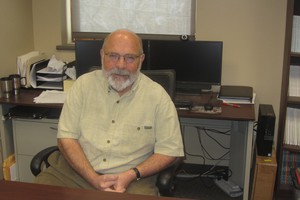Sabbatical yields insights into legislative process in Mexico

CHADRON – A one-semester sabbatical last year gave Chadron State College Associate Professor of Communication and Social Sciences Dr. Robert Knight the opportunity for on-the-ground fieldwork to reinforce his statistical research about the inner workings of the political process in Mexico.
While Mexico has a presidential system somewhat like that in the United States, it also has multiple political parties, unlike the American two-party arrangement. That can make the process of enacting legislation more complicated, particularly if no party has an outright majority in the legislative body, because different groups must form coalitions to pass laws, Knight said.
In Mexico, one party – the Institutional Revolutionary Party (PRI) – controlled both the executive and legislative branches of government for almost 70 years, and was essentially able to rule in an authoritarian manner, Knight said. But PRI lost its majority in the congress in 1997 and lost the presidency with the election of Vicente Fox from the National Action Party (PAN) in 2000.
In his research, Knight has been investigating how the PRI has managed to maintain a degree of control of lawmaking, despite not having majority control of the legislature. However, it regained the presidency in 2012 after Fox left office.
“I’m particularly interested in agenda control. Who controls the agenda makes a tremendous difference in terms of outcomes. It’s not so simple as just the majority decides,” Knight said. “The idea is that if something becomes law that the party is against, that’s bad for the party brand. The party that controls the agenda will not allow something to come to a vote that they oppose.”
To study the subject, Knight, with the aid of CSC student assistants, has been compiling records of every vote in the 500-member Mexican Chamber of Deputies, which is similar to the U.S. House of Representatives, since 1998. That data, which includes the party affiliation of the voting members, allows Knight to look at patterns of coalition forming, and to see if a particular political party was successful in blocking legislative proposals it didn’t like.
Analysis of the data indicates that, except for a period from 1997 to 2000, PRI was largely able to keep legislation that it opposed from coming to a vote in the Chamber of Deputies, Knight said.
“They reestablished their agenda control without having a majority,” he said. “The big puzzle is how could they do that, and the answer I come up with is they are more strategic. They position themselves wherever they need to in order to be able to control the agenda.”
While statistics provided a tool for studying the complicated political process, Knight said he used his sabbatical for a month-long trip to Mexico to back up his analysis.
“You want that reality check,” he said. “I interviewed members of the Chamber of Deputies to make sure my statistical analysis was grounded in what the participants in the process (experienced). That provided a lot of good information for my research.”
After returning from his trip, Knight consolidated his research findings in a paper, which was published in the most recent edition of “Brazilian Political Science Review.” The open-source journal, published in English, is well known among political scientists who are Latin American scholars and accessible to anyone interested in the political process, Knight said.
Besides interviewing legislators, Knight used his sabbatical to tour important monuments in Mexico City and to visit the historic city of Queretaro, the site of many important events in the political history of modern-day Mexico, including the writing of the Mexican constitution. That will provide additional insight when teaching his course on Mexican history.
“So many things happened in Queretaro,” he said. “I can tell students, ‘Yes, I’ve been there.’”
Knight said his interest in Mexico and in his academic specialty of comparative politics came in part from growing up near the border in California and observing the huge economic disparities between communities on either side of the boundary.
“As a young person that struck me. What could explain this just a few miles apart?” he said.
Political differences account for only part of the gap in economic circumstances, and it has lessened in recent years, Knight said. But Mexicans, who voted the PRI out in part because of rampant corruption, are still dealing with political scandals and concerned about economic issues and security in the face of rising crime rates, he said.
With the next Mexican presidential election coming later this year, Andres Manuel Lopez Obrador from the leftist National Regeneration Movement (MORENA) is leading in the polls, but Knight said his research indicates the PRI could still control the legislative process even if its candidate doesn’t win the top office.
“It’s the ability of PRI to position itself as the coalition maker and therefore control the agenda,” Knight said. “There is a good chance (Obrador) will get elected, but the PRI will stop everything he tries to do and he’ll end up in gridlock and nothing being done.”
Meanwhile Knight said he plans to continue exploring the issue of coalition building and agenda control with additional research, this time into the actions of the Mexican Senate.
“We are putting in data,” he said. “I think I’ll find something similar of the ability of the PRI to control the agenda without a majority.”
Category: Campus News, Communication, Employee Awards & Achievements, Social Sciences
